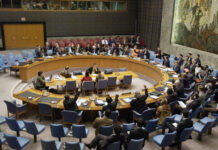Photo credit: DiasporaEngager (www.DiasporaEngager.com).
This March, Argentina’s school year began with empty classrooms. The price of learning materials rose by 502 percent over the past year, leaving many children unprepared for the year to come. And the teachers? On strike after President Javier Milei announced deep cuts to their salaries.
There’s something much larger happening here: Workers rights are under attack in an already vastly unequal society. Labor income inequality has been on the decline in many Latin American countries like Chile, Colombia, and Mexico. In Argentina, it’s been on the rise.
Since the 1960s, Argentina has been in an unprecedented period of macroeconomic instability. Stagnating in the lead-up to, and during, the dictatorship years (1976-1983), the country’s economy has reeled from crisis upon crisis — punctuated with the occasional period of recovery and growth. As the decades wore on, public distrust and discontent produced a deep social divide. Argentines call this phenomenon la grieta (“the rift”).
During his successful presidential bid last year, Milei seized upon these conditions. TV personality and self-proclaimed anarcho-capitalist, the eccentric economist promised to correct Argentina’s path and make what he called the “political caste” pay for their mismanagement of the country. Wielding a chainsaw while he campaigned, Milei vowed to eliminate state ministries, abolish the central bank, roll back abortion rights, and dollarize the economy.
Now that he’s had a chance to implement his platform, working families — not an elite “political caste” — are footing the bill for his far-right economic project.
In the two months before Milei took office in December, inflation was running between 143 and 161 percent. In February, inflation soared to more than 254 percent and the poverty rate reached 57 percent — the highest in decades.
Argentina’s labor movement has quickly mobilized widespread and effective opposition to his policies. While strikes and protests continue, we can already begin to draw lessons on resisting the far-right’s rise worldwide.
Milei takes a chainsaw to workers rights
After taking office on December 10, 2023, Milei acted swiftly. Declaring “There is no alternative to shock,” the president immediately devalued the peso by 50 percent, lifted price controls, and dissolved half of the country’s ministries.
Milei’s government then launched an offensive on workers rights. On December 14, the newly appointed Minister of Security announced a new protest protocol. Consolidating control of Argentina’s security forces and creating a registry for organizations suspected of “instigating” the protocol allowed federal forces to use increased surveillance and violence.
Source of original article: Institute for Policy Studies (ips-dc.org).
The content of this article does not necessarily reflect the views or opinion of Global Diaspora News (www.GlobalDiasporaNews.com).
To submit your press release: (https://www.GlobalDiasporaNews.com/pr).
To advertise on Global Diaspora News: (www.GlobalDiasporaNews.com/ads).
Sign up to Global Diaspora News newsletter (https://www.GlobalDiasporaNews.com/newsletter/) to start receiving updates and opportunities directly in your email inbox for free.





























